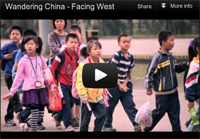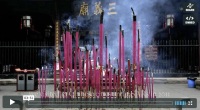Wow.

Chen Guangcheng accompanied by U.S. Ambassador to China Gary Locke (R) at a hospital in Beijing Photo: REUTERS
The narratives of fallen princeling and blind activist converge to change the complexion of the Chinese meta narrative. Or so it seems. Recent media glare has been nothing short of intense.
Trending like wildfire in both traditional and new media, Bo Xilai and now Chen Guangcheng (陈光诚) are certainly making headlines in a landscape where Chinese soft power and its national image seems to be taking a global hit.
Has the CCP’s grip on power and control of information facing an unprecedented challenge since 1989? Perhaps things have gotten out of hand in an unsteady transition to a new generation of leadership, encumbered by legacies on one hand, and suspicion on the other.
Is the party finally showing a vulnerability not seen in decades? China’s Great Firewall of censorship is now on overdrive as all manner of search terms have been banned – to the extent of Chen’s surname, which is one of the most common of Chinese surnames.
A previously successful message illuminated by the headlights of economic growth now sees new challenges. This in some ways was to be expected. As China opened up and learnt the ways of connectivity with networked societies, it had to learn to cross the river of old paradigms of building great walls one stone at a time.
Whatever way it goes, this is an interesting twist to China’s policy of non-intervention as it pushes its definition of domestic out of traditional boundaries to signal transnational reactions to whatever it sees as a domestic affair – translating to its people and territory as it demanded the US to return Chen, seen here as an act of petulance over dissent. The nationalistic Global Times postures the Chinese position clear in ‘Chen and embassy should not delude themselves‘.
In a nutshell –
One blind dissident once characterized for bringing international attention to forced late-term abortions reveals the Chinese sleight of non-intervention.
The Party has never taken kindly to those who criticize its methods (Ai Weiwei took up the spotlight last year) and there are no indicators of that changing.Chen, who really punctured the utility of its one-child policy in the international press pissed them off leading to his house arrest. When he escapes, they get even more pissed off – behaving without the nuances of its peaceful co-existence paradigm and it really showed.
What is also emerging as a pattern, is that Chen, like Wang Lijun (in the Bo Xilai case), both sought refuge in American embassies in times of adversity. As it is, Chen is now back in Chinese hands after high-level talks despite wanting to go to the US. And, all this is concurrent with the fourth round of the China-U.S. Strategic and Economic Dialogue in Beijing.
To follow the story…
Two very different characters rewriting China’s script (CNN, May 2, 2012)
China urges US to stop misleading the public after harboring Chen Guangcheng (China Daily/Xinhua, May 2, 2012)
China denounces US as dissident Chen leaves embassy (AsiaOne/Reuters, May 2, 2012)
Chen Guangcheng left US embassy ‘after family threats’ (BBC, May 2, 2012)
Chen Guangcheng: America shows a naivity that beggars belief (Telegraph, May 2, 2012)
Activist Chen Guangcheng is in a new bid to leave China, baulking at high-level deal (The Australian, May 3, 2012)
– – –
Chen Guangcheng: The great escape
by J.M.
Source – Economist, published May 2, 2012
THE STORY of how Chen Guangcheng, a 40-year-old blind villager, escaped through the prison-like security cordon surrounding his home and ended up hundreds of miles away in Beijing under American diplomatic protection will long be recounted as one of the most dramatic episodes in America’s dealings with China over human rights. After six days at the American Embassy, Mr Chen left “of his own accord”, the two governments said, to receive medical treatment in a Beijing hospital. Mr Chen, it was reported, would stay in China and be allowed to attend university. A subsequent report from Associated Press stated that Mr Chen left the embassy after threats were made against his wife. Read the rest of this entry »
Filed under: Beijing Consensus, Censorship, Charm Offensive, Cheng Guangcheng, Chinese Model, Democracy, Economist, Government & Policy, Great Firewall, Human Rights, International Relations, Mapping Feelings, Media, Peaceful Development, People, Politics, Public Diplomacy, Social, Soft Power, Strategy, Tao Guang Yang Hui (韬光养晦), The Chinese Identity, The construction of Chinese and Non-Chinese identities, U.S.













The Sharing Circle